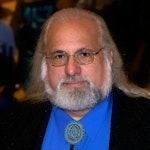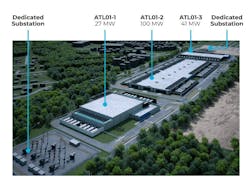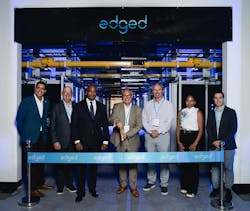Edged Data Centers Opens First Ultra-Efficient North American Data Center in Atlanta
With a planned 168 MW campus, Edged Data Centers last month opened their first of three data centers on a repurposed, 80+ acre downtown Atlanta, Georgia site, its ATL01-1 data center.
This 27 MW, new-construction, two-story facility is the company's first data center in North America and highlights Edged’s ultra-efficient, sustainable data center development model.
The new facility is strategically located at 1800 Thomas Street NW in Atlanta, the site of the formerly vacant and unused Tilford Yard.
A ribbon-cutting ceremony celebrated the transformation of the site into a thriving digital hub, and the opening of the first of three data centers located on the 168 MW campus, dubbed Edged Atlanta.
The opening event was attended by City of Atlanta and Fulton County officials, local utility provider Georgia Power and key project partners.
Jakob Carnemark, founder of Edged and its parent company Endeavour and former chief and founder of Aligned Energy, remarked:
“The Edged platform is uniquely optimized for both energy and water efficiency. Unlike traditional data centers which put significant pressure on the power grid and consume nearly 136 billion gallons of water each year in the U.S. alone, Edged Atlanta [is] outfitted with ultra-efficient waterless cooling technology that can handle high density loads -- up to 70kW/rack in air-cooled configurations and greater densities with liquid cooling plug-in components -- yet consumes no water.”
AI and HPC Liquid Cooling Ready
Like many new data centers, in Atlanta, Edged is focusing on providing a suitable facility for AI and HPC workloads.
To meet requirements for sustainability, corporate responsibility, and high-efficiency, the company is deploying the advanced waterless cooling solutions from ThermalWorks, for both air-cooled and liquid-cooled high-density racks.
The air-cooled solution can support power density of up to 70 kW per rack, while the liquid-cooled option can go to rack densities as high as 200 kW.
The modular waterless system uses glycol heat transfer with air cooled chillers, and has closed loop evaporators to provide a secondary cooling resource.
Hot aisle containment will be available for designs ranging from 250 kW to 2.5 MW. Power is being sourced from Georgia Power and there are dual utility feeds available with two dedicated substations, located at opposite ends of the campus.
With this high-efficiency cooling, Edged is expecting a PUE portfolio average.
Importantly, given the platform's waterless concept, when compared to the industry-average Water Usage Effectiveness (WUE) rating of 1.8 (defined as an industry average in 2016 by the Lawerence Berkeley National Laboratory), the comparative water savings for the entire campus is expected to average over 663 million gallons annually.
Additional Edged Atlanta Campus Highlights
For connectivity, the campus is carrier neutral, currently with multiple carrier access, and has four diverse entry points, and two available Meet-me rooms.
Other features include a 1 MW static UPS in an N+1 configuration, as well as a 24-hour fuel supply on site for the backup generators, also configured in N+1.
Edged partnered with Develop Fulton, a special unit of the county government that offers economic development services on behalf of Fulton County, Georgia, since its creation by law in 1973, that has issued over $25 billion in bonds and helped over 450 businesses.
Focusing on the partnership and the transformation of the vacant brownfield site into a modern data center campus, Bryant Farland, Edged Chief Executive Officer said:
“Atlanta is the ideal location for our first North American data center. The project sets a new standard for sustainable development and represents a $1.69 billion economic investment in the region, bringing hundreds of jobs and millions in funding for Atlanta public schools, the local government and important city services. Together, we are creating projects for positive impact and supporting the region's thriving digital economy."
Community and Workforce Development
Like many of the major data center development projects we have reported on, Edged Data Centers, in conjunction with Develop Fulton, will be including educational and employment programs for the community.
Kwanza Hall, Develop Fulton Vice-Chair, highlighted her group's involvement in the project, saying:
"We are looking forward to the implementation of an outreach program in Atlanta through the developer's Women in Tech Group. The program will focus on educating students about opportunities in sustainable infrastructure, creating a diverse pool of candidates for employment at Endeavour companies, empowering women and minorities, and generating interest among middle and high school students in sustainable technology. Our staff and board members are committed to ensuring that every project we undertake provides tangible and measurable benefits to the community, including increases in tax revenues."
Develop Fulton estimated the tax revenue generated by the project at $70 million over the next 10 years.
Future Forward
The new ATL01-1 data center will be the only two-story data center on the campus. ATL01-2 will be a single-story structure with 100 MW of critical capacity.
The final building on the current 80-acre footprint, ATL01-3, will make the remaining 41 MW of the reported 168 MW campus wide capacity available.
Edged Data Centers is also in the processof developing data center campuses in Irving, Texas; Chicago, Illinois; Mesa, Arizona; and New Albany, Ohio.
Members of Edged, Develop Fulton, Fulton County Economic Development and key project partners celebrated the opening of the first Edged data center in North America.








